|
COP
23 - WORLD CLIMATE
CHANGE CONFERENCE
CLIMATE
| ELECTRICITY
| RIGHTS
| HYDROGEN
| PLASTIC
| SPACE
| TRANSPORT
| NATIONS
Please
use our A-Z INDEX
to navigate this site, or HOME
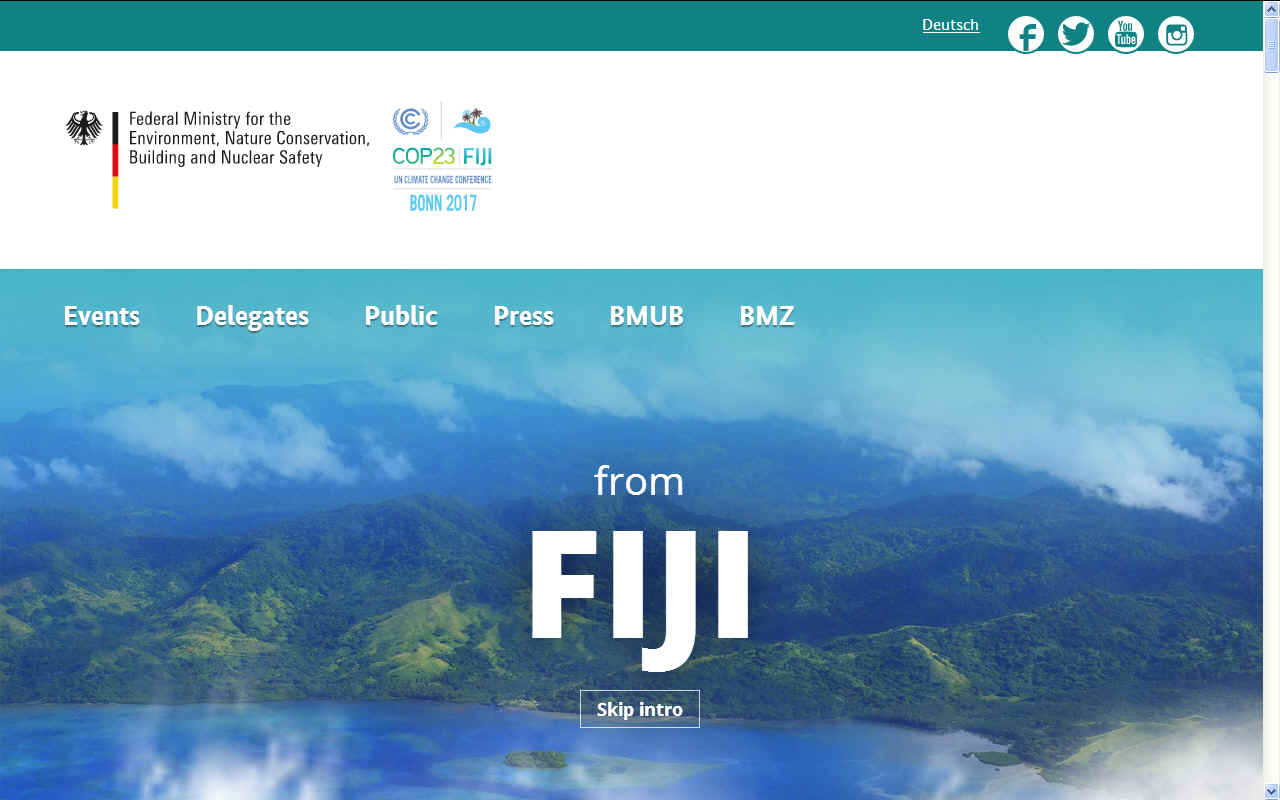
2017: COP 23/CMP 13/CMA 2, Bonn, Germany
COP 23 is expected to be held on 6–17 November 2017. On Friday, 18 November 2016, the end of COP 22, the Chairperson of COP 23 from Fiji announced that it will be held in Bonn, Germany. (COP 23/CMP 13).
Fijian Prime Minister and incoming President of COP 23, Frank Bainimarama, on 13 April launched the logo for this year’s United Nations
Climate Change Conference, to be held at UN Campus, Bonn in November.
The UN Climate Change Conference in Bonn came to a successful end
on the 18th of November 2017 after a long night of negotiations. The 197 Parties achieved important progress on implementing the Paris Agreement. The Talanoa Dialogue aims to encourage the international community over the coming year to take more ambitious action to close the global climate mitigation gap.
Federal Environment Minister Barbara Hendricks commented: "In Bonn we made great progress, both with negotiating and implementing. The conference fully satisfied expectations in this regard. And it was an important step on the road to the COP in Katowice next year, where we are planning to adopt the rulebook for the Paris Agreement. Bonn was also the first Climate Change Conference following the announcement by the Trump administration of US withdrawal from the Paris Agreement. The COP in Bonn sends a powerful signal that the world is united and will not be hindered in its climate action efforts".
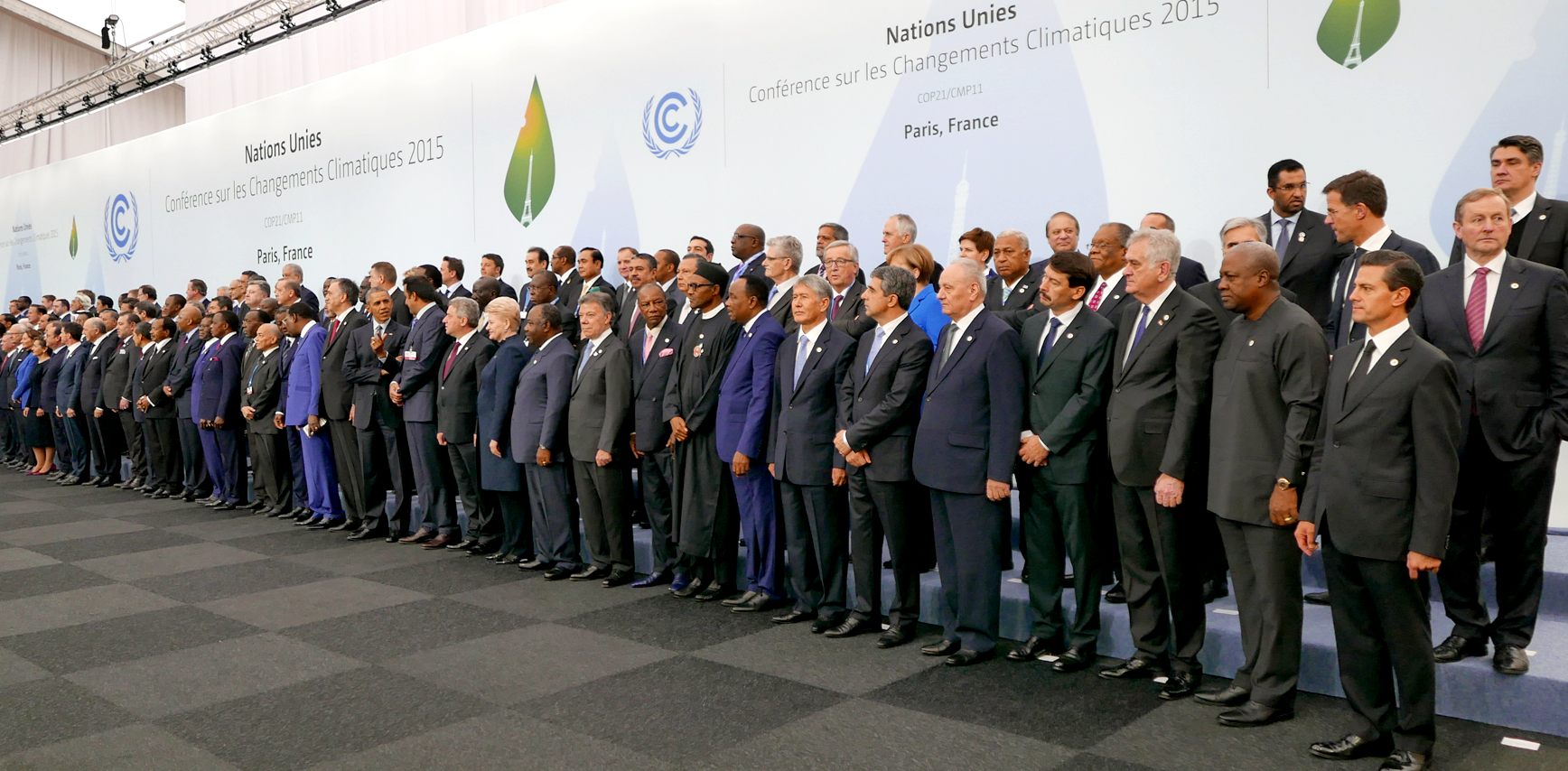
COP
THAT - The United Nations Climate Change Conferences are yearly conferences held in the framework of the United Nations Framework Convention on Climate Change
(UNFCCC). They serve as the formal meeting of the UNFCCC Parties (Conference of the Parties, COP) to assess progress in dealing with climate change, and beginning in the mid-1990s, to negotiate the Kyoto Protocol to establish legally binding obligations for developed countries to reduce their greenhouse gas emissions. From 2005 the Conferences have also served as the "Conference of the Parties Serving as the Meeting of Parties to the Kyoto Protocol"
(CMP); also parties to the Convention that are not parties to the Protocol can participate in Protocol-related meetings as observers. From 2011 the meetings have also been used to negotiate the Paris Agreement as part of the Durban platform activities until its conclusion in 2015, which created a general path towards climate action. The first UN Climate Change Conference was held in 1995 in Berlin.
One key outcome of the conference is the Talanoa Dialogue. Talanoa is a Fiji term fora conversation in which the people involved share ideas and resolve problems. As the sum total of the current climate targets under the Paris Agreement is not yet sufficient for limiting global warming to well below two degrees Celsius, agreement was reached in Paris that the international community would have to raise the level of ambition over time. The Talanoa Dialogue is the trial run for this ambition mechanism. Under the leadership of Fiji and Poland, this dialogue aims to bring together contributions from the scientific sector, industry and civil society over the coming years. The result will be a stocktake geared to motivating the Parties to take more ambitious action to close the global climate mitigation gap.
Other key progress was made with the rulebook, in other words the implementing provisions of the Paris Agreement. These determine, for example, how countries measure and report their greenhouse gas emissions. The Parties drafted texts in Bonn on all issues to be finalised and adopted by the COP in Katowice in 2018.
In parallel to the negotiations, the implementation agenda was also advanced in Bonn: Countries, industry and civil society presented a broad spectrum of climate action solutions in hundreds of events. One example of progress outside of the negotiations is the NDC Partnership, which helps developing countries draw up national climate action strategies. The Partnership was able to considerably expand its work here in Bonn.
Germany was the technical host of the COP, which was presided over by Fiji. The Bonn Climate Change Conference was the largest ever intergovernmental conference held in Germany. Over the two weeks, a total of 22,000 participants attended, with more than 4,500 volunteers. Minister Hendricks commented: "Bonn was an excellent host. The COP strengthened Bonn's standing as a location for international organisations and conferences. Our concept of "one conference – two zones" was a success. Both the Bula Zone for negotiations and the Bonn Zone with its projects and examples of implementation were very busy. I am sure that this combination of negotiation and implementation will serve as a model for future Climate Change Conferences".
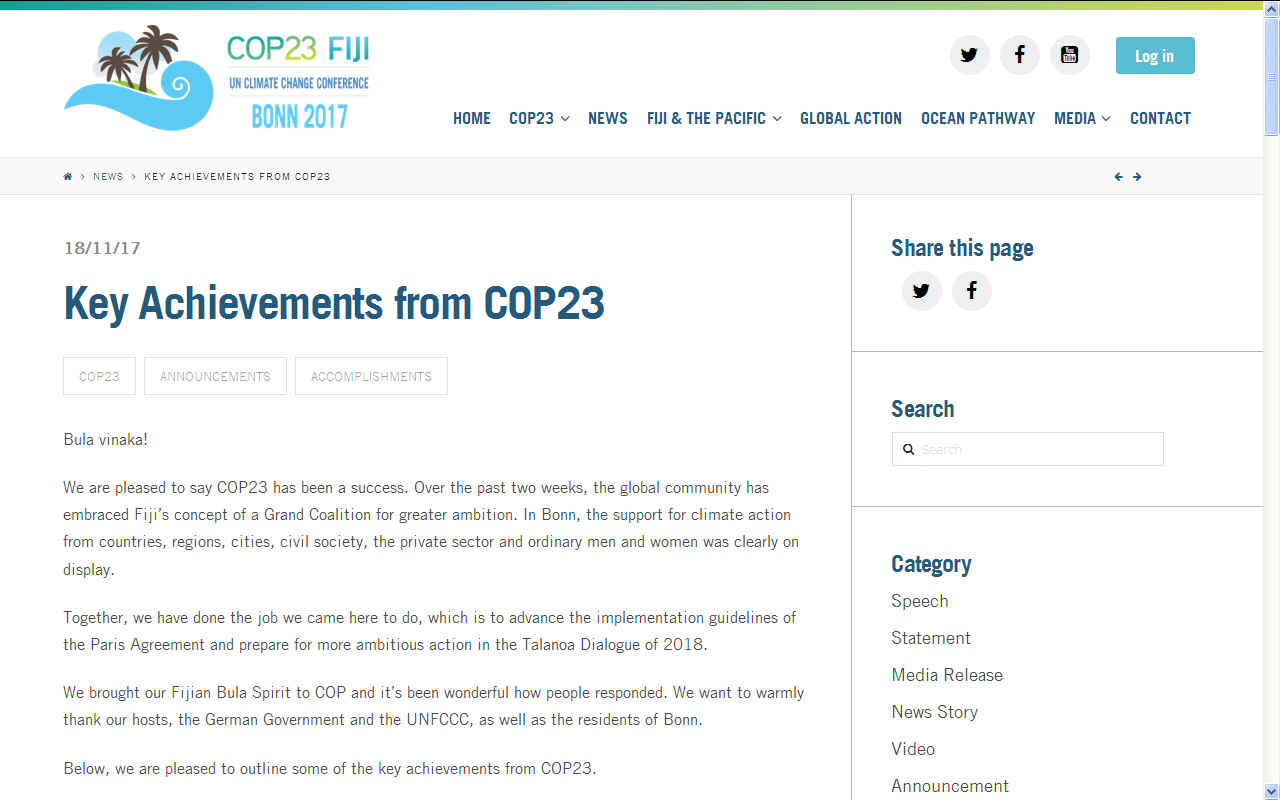
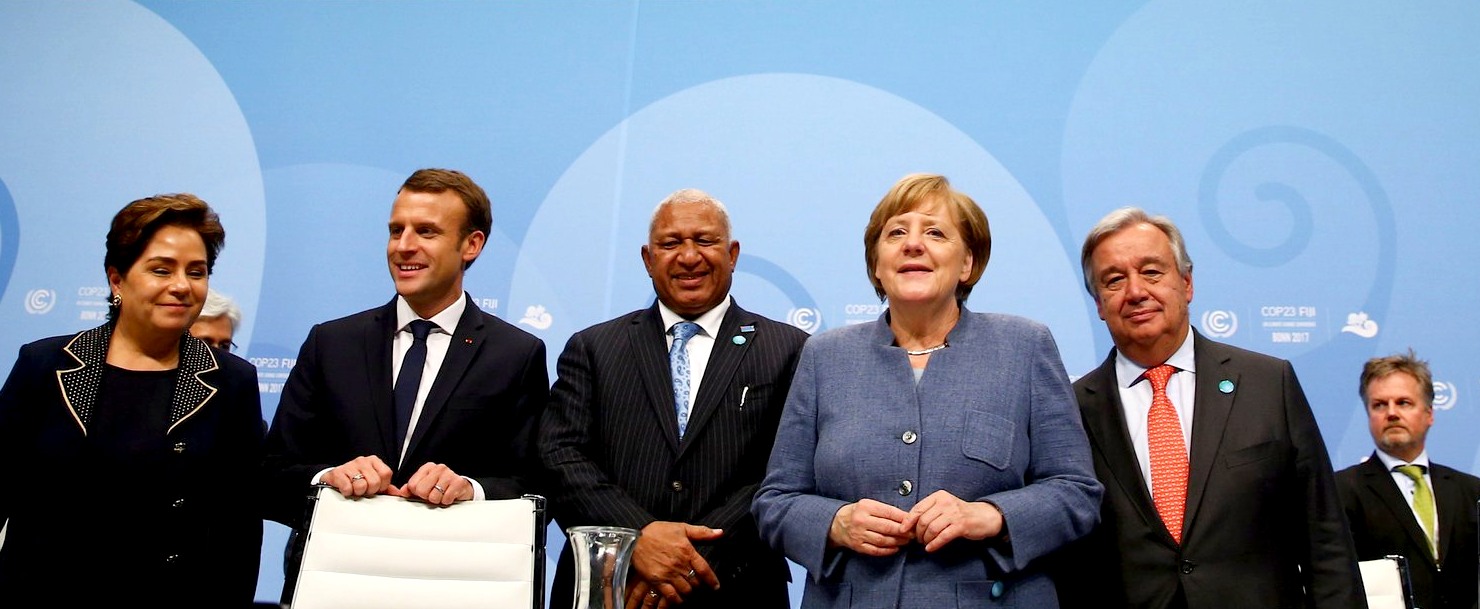
NEW
YORK TIMES - BONN, Germany — Perhaps the most revealing moment at this year’s United Nations climate talks came on Wednesday, when Chancellor Angela Merkel of Germany addressed the nearly 200 nations gathered here.
After declaring that “climate change is an issue determining our destiny as mankind,” Ms. Merkel acknowledged that Germany was likely to miss the goals it had set itself for cutting greenhouse gas emissions by 2020 because of its continued reliance on coal power. While vowing to grapple with the issue, she said that phasing out coal use would require “tough discussions” with German policymakers in the weeks ahead.
On one level, it was a stark reminder that the real action on global warming does not unfold in international venues. The problem will largely be addressed by governments back home trying to adopt policies to shift away from fossil fuels, by businesses perfecting and deploying clean energy technologies, by city planners reworking their local transportation systems.
But Ms. Merkel’s speech was an example of what diplomats are trying to achieve. As the two-week Bonn talks concluded on Saturday, negotiators said they had made headway on creating a formal process under the 2015 Paris agreement in which world leaders would regularly and publicly detail the efforts they are making to address climate change, pinpoint areas where they are falling short, and push each other to do more.
KEY
ACHIEVEMENTS OF COP 23
"Bula vinaka!
We are pleased to say COP23 has been a success. Over the past two weeks, the global community has embraced Fiji’s concept of a Grand Coalition for greater ambition. In Bonn, the support for climate action from countries, regions, cities, civil society, the private sector and ordinary men and women was clearly on display.
Together, we have done the job we came here to do, which is to advance the implementation guidelines of the Paris Agreement and prepare for more ambitious action in the Talanoa Dialogue of 2018.
We brought our Fijian Bula Spirit to COP and it’s been wonderful how people responded. We want to warmly thank our hosts, the German Government and the UNFCCC, as well as the residents of Bonn.
Below, we are pleased to outline some of the key achievements from COP23."
2018 Talanoa Dialogue: After extensive consultations, the Fijian COP23 Presidency announced an inclusive and participatory process that allows countries, as well as non-state actors, to share stories and showcase best practices in order to urgently raise ambition – including pre-2020 action – in nationally determined contributions (NDCs). This is ultimately to enable Parties to collectively move closer to the more ambitious Paris Agreement goal of keeping the rise in global temperature to 1.5 degrees Celsius.
Launch of Ocean Pathway Partnership: The Fijian COP23 Presidency launched the Ocean Pathway Partnership to encourage the climate negotiations process to address the relationship between climate change and the ocean. In the true spirit of the Grand Coalition, the partnership will also consolidate existing work being done to create a coordinated effort among governments at all levels, existing ocean alliances and coalitions, civil society and the private sector to create a stronger link between climate action and a healthy ocean. The partnership will be co-chaired by Fiji and Sweden, who are joining forces again after leading the inaugural UN Ocean Conference in July.
Launch of InsuRelience Global Partnership: The German Federal Ministry for Economic Cooperation and Development (BMZ) contributed 110 million euros (US $125 million) to launch the InsuResilience Global Partnership for Climate and Disaster Risk Finance and Insurance Solutions to bring affordable insurance and other financial protection to millions of vulnerable people around the world. The contribution from BMZ follows a £30 million (US $39 million) commitment that was made by the Government of the United Kingdom in July.
Launch of the Fiji Clearing House for Risk Transfer: This new online resource will help connect vulnerable countries with the best available information on affordable insurance and solutions – tailored to their unique circumstances – that will allow them to better prepare for the risks posed by climate change.
Finalisation of the Gender Action Plan: Parties finalised the first-ever Gender Action Plan, which aims to increase the participation of women in all UNFCCC processes. It also seeks to increase awareness of and support for the development and effective implementation of gender-responsive climate policy at all levels of government.
Finalisation of the Local Communities and Indigenous Peoples Platform: This platform will provide direct and comprehensive means to give a greater voice to indigenous people in the climate negotiations and allow them to share their traditional knowledge and best practices on reducing emissions, adapting to climate change and building resilience.
Historic Breakthrough in Agriculture: Parties reached a historic agreement on agriculture that will help countries develop and implement new strategies for adaptation and mitigation within the sector, to both reduce emissions as well as build resilience to the effects of climate change.
Adaptation Fund: The Adaptation Fund was replenished with a total of US $93.3 million, exceeding this year’s funding target by US $13 million. The Adaptation Fund has a track record of providing valuable resources to communities in developing countries for projects that help improve resilience to the effects of climate change. Projects may apply for funding to Adaptation Fund Board, which reviews applications through a transparent process. Parties also took the important next step to ensure that the Adaptation Fund shall serve the Paris Agreement.
America’s Pledge: A delegation of sub-national leaders led by Gov. Jerry Brown of California and former New York City Mayor Michael Bloomberg presented a report on the ongoing efforts by American states, cities, businesses and civil society to uphold the emissions reduction target of the United States under the Paris Agreement.
Bonn-Fiji Commitment: Local and regional leaders gathered to officially adopt the Bonn-Fiji Commitment of Local and Regional Leaders to Deliver the Paris Agreement at All Levels, a pledge that signals their commitment to bring forward a critical shift in global development. The Bonn-Fiji Commitment highlights the pledge to raise collective ambition for climate action.
Launch of the NDC Regional Hub: The NDC Partnership is establishing a new regional hub to support the implementation of NDCs in the Pacific. The Regional Pacific NDC Hub will be based in Suva, Fiji, and will provide expertise for developing regional solutions to mitigate global warming and enhance efforts by Pacific islands to adapt to climate change.
Health Initiative for the Vulnerable: The World Health Organisation, in collaboration with the UNFCCC and the Fijian COP23 Presidency launched a special initiative to protect people living in Small Island Developing States from the health impacts of climate change. Its goal by 2030 is to triple the levels of international financial support to climate and health in Small Island Developing States.
First Open Dialogue between Parties and Non-Party Stakeholders: The Fijian COP23 Presidency presided over the first ever Open Dialogue between Parties and Non-Party Stakeholders (NPS) within the formal climate negotiations. Discussions were held surrounding two important topics. The first was how NPS can help Parties design and implement more ambitious NDCs and the second was how to better integrate NPS into the climate negotiations process. Based on the success of the dialogue, there was strong enthusiasm to continue similar discussions at future COP meetings.
Expert Dialogue on Loss and Damage: Provides important space to raise awareness about the vulnerability of small island states. It will explore options for mobilising expertise, technology and support for the victims of climate change.
For a complete list of announcements at COP23, please visit the
UNFCCC’s
website.
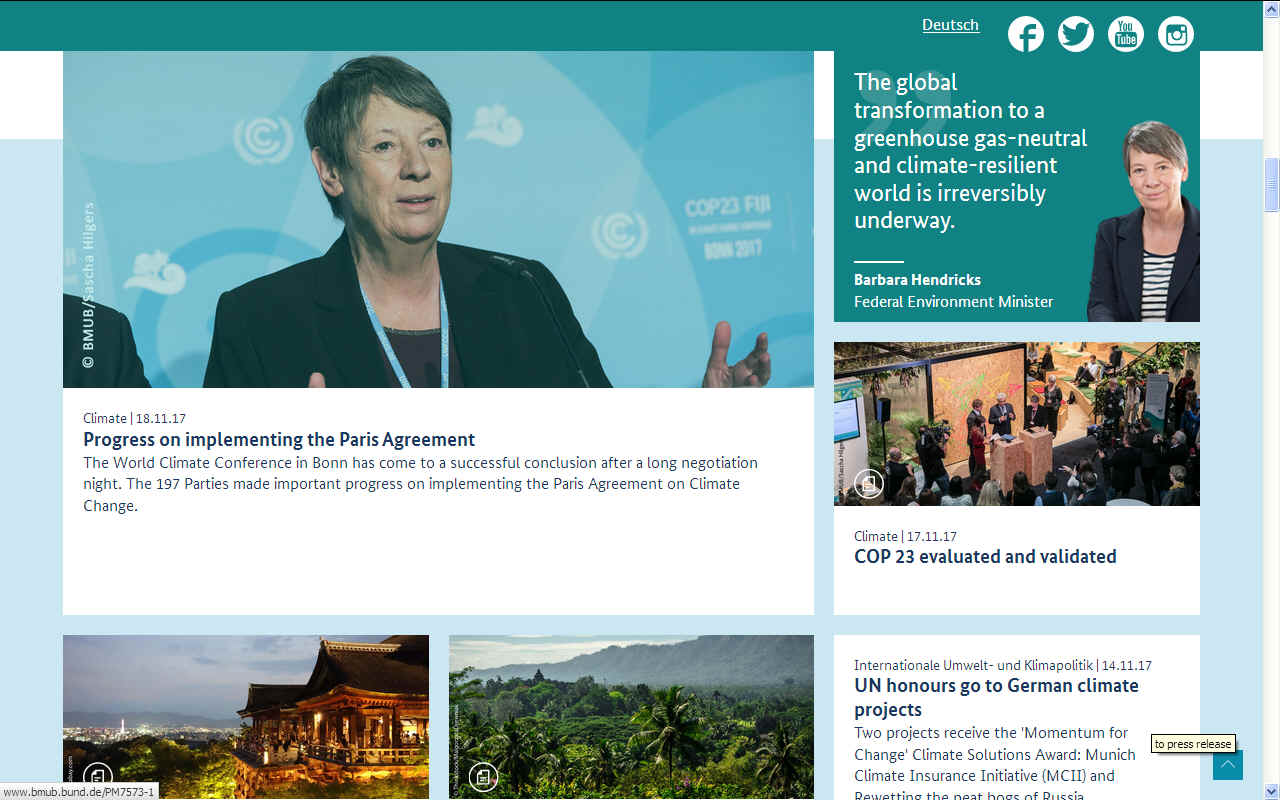
NEW
YORK TIMES 17 NOVEMBER 2017 - ISLAND NATIONS WITH NO TIME TO
LOSE
BONN, Germany — Fijian singers strumming ukuleles serenade delegates to the United Nations climate talks as they enter the conference hall. A traditional two-hulled sailing craft, or drua, is on display by the entrance to signify that when it comes to rising seas, all nations are in the same boat.
But as two weeks of negotiations on bolstering the Paris agreement draw to a close, island leaders say the décor seems a cruel taunt.
Fiji, a sunny island nation in the South Pacific, is the official host of the climate discussions here in chilly Bonn. But leaders say their hopes that island issues would take center stage have mostly been dashed. Almost none of the measures to help their countries adapt to the impacts of global warming have been resolved, and few delegates say they are hopeful the final hours of talks will bring decisions.
“I’m anxious and I’m fearful,” said Allen Michael Chastanet, the prime minister of St. Lucia. “It can’t be that a prime minister’s only resource is to get down on his knees on the side of a bed and pray.”
From rising seas to the loss of fresh water, islands are among the most vulnerable nations to global warming. Hurricanes, expected to become more ferocious with climate change, pummeled Caribbean island nations into crisis this summer. Irma destroyed nearly every car and building on the island of Barbuda and swelled the population of Antigua overnight as thousands of Barbudans sought shelter. Maria knocked out power across the United States Virgin Islands and Puerto Rico and left Dominica in tatters.

HOW
MUCH IS THE EARTH HEATING UP - As of early 2017, the Earth
had warmed by roughly 2 degrees Fahrenheit (more than 1 degree
Celsius) since 1880, when records began at a global scale. The
number may sound low, but as an average over the surface of an
entire planet, it is actually high, which explains why much of
the world’s land ice is starting to melt and the oceans are
rising at an accelerating pace. If greenhouse gas emissions
continue unchecked, scientists say, the global warming could
ultimately exceed 8 degrees Fahrenheit, which would undermine
the planet’s capacity to support a large human population.
Small islands also are among the smallest contributors to climate change, producing less than 1 percent of global greenhouse gas emissions. The industrialized world, their leaders say, owes some recompense for the disasters these vulnerable nations will suffer in the years ahead.
“The very thing that makes them wealthy is contributing to our vulnerability,” said Prime Minister Gaston Browne of Antigua and Barbuda. “It’s only fair that they provide some level of compensation.”
But hopes are waning that island nations will see a major increase in financial support to help address the consequences of climate change. So, too, is an effort here to expand ways for nations to adapt to future disasters. Money is not forthcoming here, and President Trump has declared that the United States, historically the largest emitter of greenhouse gases, will exit the Paris agreement.
In the Maldives, in the Indian
Ocean, rising sea levels are causing salt water to intrude into underground fresh water supplies. In order to adapt, the country is trying to build rainwater cisterns and new pipe systems to ensure that its people have safe drinking water supplies.
It’s a costly task, and the Maldives was one of the first countries to apply for aid from the Green Climate Fund, which was set up in 2010 by wealthy countries to help poorer nations adapt to climate change. Yet the fund has been slow to start and the country waited two years before seeing any of the promised funding.
“That’s too long to wait,” said Thoriq Ibrahim, the minister of energy and environment in the Maldives. “There’s no use having a fund somewhere if you can’t access it quickly.”
While most wealthy countries agree in principle that they should deliver more aid, the details of how to do it have been bogged down in the slow bureaucratic processes of United Nations talks. On Friday delegates here did create an expert group to formally include the issue of helping vulnerable countries with immediate needs, known as loss and damage, in the United Nations climate process. There is no money attached to it, though, nor means to raise any.
So far, the biggest news came midweek, when Germany and Britain announced funding for a long-discussed partnership to promote insurance coverage in island nations vulnerable to disasters. Aiyaz Sayed-Khaiyum, the attorney general of Fiji, said that only 10 percent of the island’s properties were insured, which made recovery from disasters like Cyclone Winston — which devastated the island in 2016 — much slower.
Yet there’s also wide recognition that insurance is, at best, a stopgap measure. “It can help people recover from floods or cyclones. But it doesn’t help against slow onset events like sea-level rise — no one will insure against that,” said Harjeet Singh, global head of climate change for ActionAid International. He also noted that many of the details of the new insurance proposal were still vague, like how much relatively poor island countries would have to pay in premiums.
Some island officials, frustrated by the slowness of the United Nations process, have decided to take matters into their own hands.
The Seychelles, for instance, has been promoting its debt swap program, started in 2015 with the help of The Nature Conservancy, in which a group of investors agreed to restructure $30 million of the country’s debt if the island agreed to protect 30 percent of its ocean habitat. The country plans to channel the money into measures like protecting coral reefs that shield the island from storm surges but are vulnerable to rising ocean temperatures.
Ronald Jumeau, the ambassador from the Seychelles to the United Nations, has largely stayed away from the formal climate negotiations this week, instead talking about similar innovative financing arrangements with philanthropists and private investors who have showed up in Bonn. He argued that island nations may have to look outside the United Nations process for help.
“We all know what the problem is. Why depress ourselves by sitting around the table and moaning about it?” Mr. Jumeau said. “Too many people are fixated on this government process. I’m going to where the money is.”
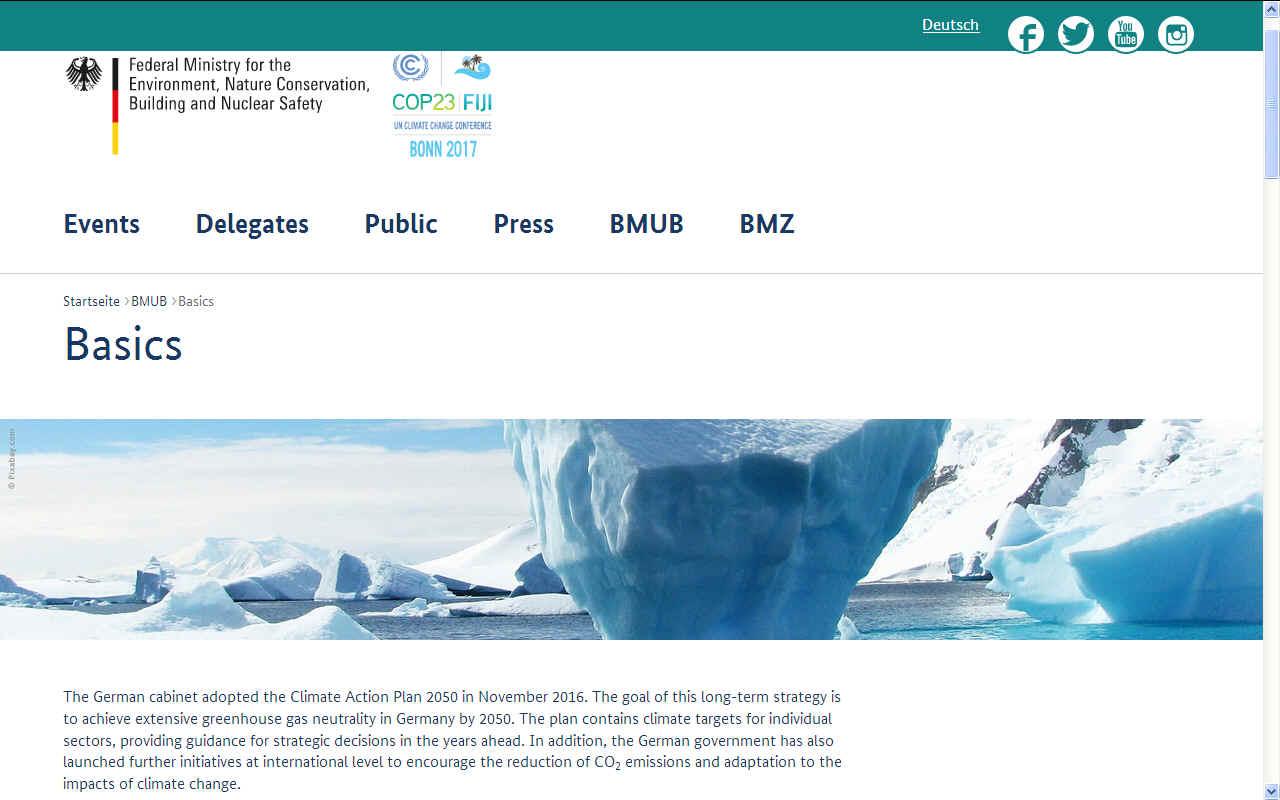
WOULD
YOU LIKE ICE WITH THAT ? - The polar ice caps are melting
while we fiddle, like Nero fiddling while Rome burned. In July of 64 A.D., a great fire ravaged Rome for six days, destroying 70 percent of the city and leaving half its population homeless. According to a well-known expression, Rome’s emperor at the time, the decadent and unpopular Nero, “fiddled while Rome burned.” The expression has a double meaning: Not only did Nero play music while his people suffered, but he was an ineffectual leader in a time of crisis.
1995 COP
1,
BERLIN, GERMANY
1996 COP
2, GENEVA, SWITZERLAND
1997 COP
3, KYOTO, JAPAN
1998 COP
4, BUENOS AIRES, ARGENTINA
1999 COP
5, BONN, GERMANY
2000:COP
6, THE HAGUE, NETHERLANDS
2001 COP
7, MARRAKECH, MOROCCO
2002 COP
8, NEW DELHI, INDIA
2003 COP
9, MILAN, ITALY
2004 COP
10, BUENOS AIRES, ARGENTINA
2005 COP
11/CMP 1, MONTREAL, CANADA
2006 COP
12/CMP 2, NAIROBI, KENYA
2007 COP
13/CMP 3, BALI, INDONESIA
2008 COP
14/CMP 4, POZNAN, POLAND
2009
COP 15/CMP 5, COPENHAGEN, DENMARK
2010 COP
16/CMP 6, CANCUN, MEXICO
2011 COP
17/CMP 7, DURBAN, SOUTH AFRICA
2012 COP
18/CMP 8, DOHA, QATAR
2013 COP
19/CMP 9, WARSAW, POLAND
2014 COP
20/CMP 10, LIMA, PERU
2015 COP
21/CMP 11, PARIS, FRANCE
2016 COP
22/CMP 12/CMA 1, MARRAKECH, MOROCCO
2017 COP
23/CMP 13/CMA 2, BONN, GERMANY
2018 COP
24/CMP 14/CMA 3, KATOWICE, POLAND
2019 COP
25/CMP 15/CMA 4, Santiago, Chile
2020
COP 26/CMP 16/CMA 5 TBA
DESERTIFICATION
COP HISTORY
|
COP
1:
Rome, Italy, 29 Sept to 10 Oct 1997
|
COP
9: Buenos Aires, Argentina, 21 Sept to 2 Oct
2009
|
|
COP
2: Dakar, Senegal, 30 Nov to 11 Dec 1998
|
COP
10: Changwon, South Korea, 10 to 20 Oct 2011
|
|
COP
3: Recife, Brazil, 15 to 26 Nov 1999
|
COP
11: Windhoek, Namibia, 16 to 27 Sept 2013
|
|
COP
4: Bonn, Germany, 11 to 22 Dec 2000
|
COP
12: Ankara, Turkey, 12 to 23 Oct 2015
|
|
COP
5: Geneva, Switzerland, 1 to 12 Oct 2001
|
COP
13: Ordos City, China, 6 to 16 Sept 2017
|
|
COP
6: Havana, Cuba, 25 August to 5 Sept 2003
|
COP
14: New Delhi, India, 2 to 13 Sept 2019
|
|
COP
7: Nairobi, Kenya, 17 to 28 Oct 2005
|
COP
15: 2020
|
|
COP
8: Madrid, Spain, 3 to 14 Sept 2007
|
COP
16: 2021
|
BIODIVERSITY
COP HISTORY
|
COP
1:
1994 Nassau, Bahamas, Nov & Dec
|
COP
8: 2006 Curitiba, Brazil, 8 Mar
|
|
COP
2: 1995 Jakarta, Indonesia, Nov
|
COP
9: 2008 Bonn, Germany, May
|
|
COP
3: 1996 Buenos Aires, Argentina, Nov
|
COP
10: 2010 Nagoya, Japan, Oct
|
|
COP
4: 1998 Bratislava, Slovakia, May
|
COP
11: 2012 Hyderabad, India
|
|
EXCOP:
1999 Cartagena, Colombia, Feb
|
COP
12: 2014 Pyeongchang, Republic of Korea, Oct
|
|
COP
5: 2000 Nairobi, Kenya, May
|
COP
13: 2016 Cancun, Mexico, 2 to 17 Dec
|
|
COP
6: 2002 The Hague, Netherlands, April
|
COP
14: 2018 Sharm El-Sheikh, Egypt, 17 to 29
Nov
|
|
COP
7: 2004 Kuala Lumpur, Malaysia, Feb
|
COP
15: 2020 Kunming, Yunnan, China
|
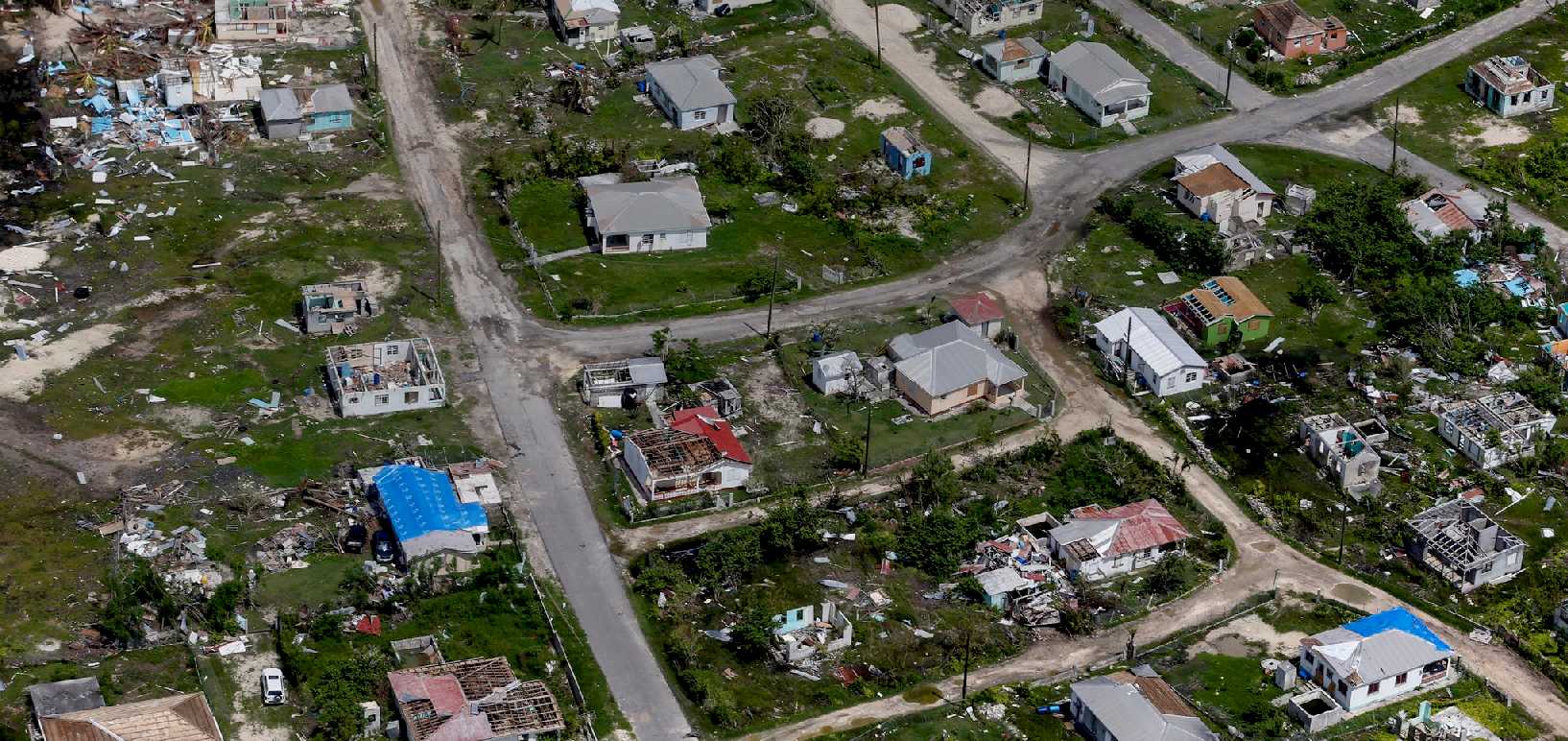
HOW
MUCH TROUBLE ARE WE IN - Big trouble. Over the coming 25
or 30 years, scientists say, the climate
is likely to gradually warm, with more extreme weather. Coral
reefs and other sensitive habitats are already starting to
die. Longer term, if emissions rise unchecked, scientists fear
climate effects so severe that they might destabilize
governments, produce waves of refugees, precipitate the sixth
mass extinction of plants and animals in the Earth’s
history, and melt the polar ice caps, causing the seas to rise
high enough to flood most of the world’s coastal cities. The
emissions that create those risks are happening now, raising
deep moral questions for our generation.
CONTACTS
World Conference Center Bonn
Platz der Vereinten Nationen 2
53113 Bonn
t: +49 (0)228-9267-0
f: +49 (0)228-9267-110
info(at)worldccbonn.com
COP23 Presidency Secretariat
9th Floor Suvavou House,
Victoria Parade
PO Box 2212, Govt Buildings,
Suva, Fiji
Email: info@cop23.com.fj
Phone: +679 3216761
Media Enquiries: media@cop23.com.fj
Floor 3
2 America Square,
London EC3N 2LU
United Kingdom
TEL: +44 (0)20 7871 0173
FAX: +44 (0)20 7871 0101
info@climateactionprogramme.org
http://www.climateactionprogramme.org
For sponsorship and exhibition opportunities
Nick
Rastall, Commercial Director
Tel: +44 (0)20 7871 0173
Email: nrastall@climateactionprogramme.org
Marketing & Press
Agnes Gradzewicz, Marketing Department
Tel: +44 (0)20 7871 0173
Email: agnesg@climateactionprogramme.org
Speaking opportunities
Melina Diamantopoulou, Head of Production
Tel: +44 (0)20 7871 0173
Email: melinad@climateactionprogramme.org
Operations queries
Maria Stavrou, Head of Operations
Tel: +44 (0)20 7871 0123
Email: marias@climateactionprogramme.org
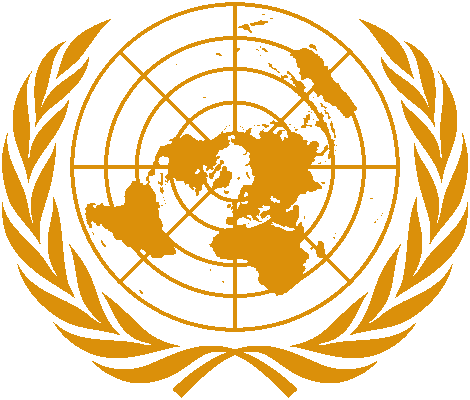
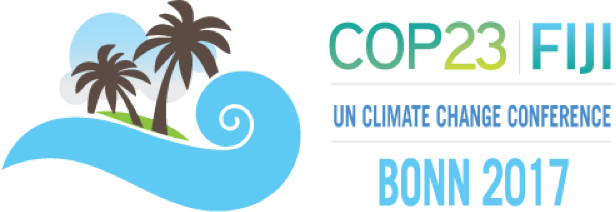
LINKS
& REFERENCE
info@climateactionprogramme.org
http://www.climateactionprogramme.org
http://www.cop-23.org/
https://www.cop23.de/en/
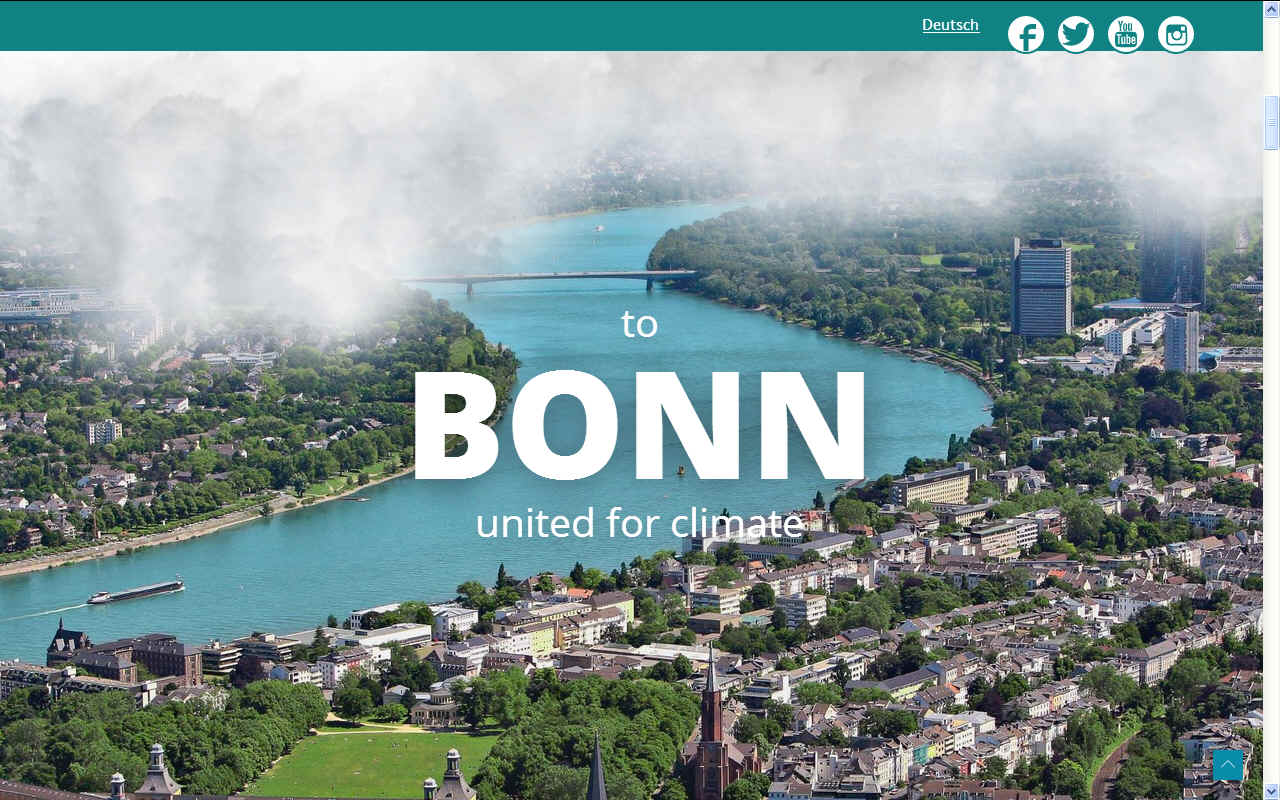
ABOUT - CIRCUMNAVIGATION
- CONTACTS
- DONATE
- FOUNDATION
-
HOME - A-Z INDEX
This
website is provided on a free basis as a public information
service. copyright © Cleaner
Oceans Foundation Ltd (COFL) (Company No: 4674774)
2019. Solar
Studios, BN271RF, United Kingdom.
COFL
is a charity without share capital. The names AmphiMax™,
RiverVax™
and SeaVax™
are trade names used under license by COF in connection with their 'Feed
The World' ocean cleaning sustainability campaign.
|










